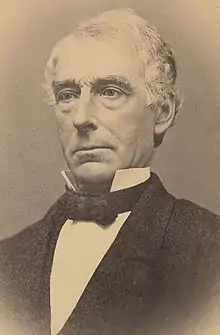Alonzo Garcelon | |
|---|---|
 | |
| 36th Governor of Maine | |
| In office January 8, 1879 – January 7, 1880 | |
| Preceded by | Seldon Connor |
| Succeeded by | Daniel F. Davis |
| Mayor of Lewiston, Maine | |
| In office 1871 | |
| Preceded by | William H. Stevens |
| Succeeded by | David Cowan |
| Member of the Maine Senate | |
| In office 1855–1856 | |
| Member of the Maine House of Representatives | |
| In office 1853–1854 1857–1858 | |
| Personal details | |
| Born | May 6, 1813 Lewiston, Massachusetts, U.S. |
| Died | December 8, 1906 (aged 93) Medford, Massachusetts, U.S. |
| Resting place | Riverside Cemetery Lewiston, Maine, U.S. |
| Political party | Democratic |
| Other political affiliations | Whig, Free Soiler, Republican |
| Alma mater | Bowdoin College Medical University of Ohio |
| Profession | Physician |
| Military service | |
| Allegiance | United States of America Union |
| Branch/service | United States Army Union Army |
| Years of service | 1861–1865 |
| Rank | Surgeon General |
| Battles/wars | American Civil War |
Alonzo Garcelon (May 6, 1813 – December 8, 1906) was the 36th governor of Maine, and a surgeon general of Maine during the American Civil War.
Early life and education
Garcelon was born in Lewiston (in modern-day Maine, then a part of Massachusetts), to French Huguenot parents. Garcelon attended Monmouth Academy, Waterville Academy, and New Castle Academy. Garcelon taught school during the winter terms to help pay for his tuition. In 1836 Garcelon graduated from Bowdoin College, and in 1839 he graduated from the Medical College of Ohio in Cincinnati, Ohio, and then returned to Lewiston to practice. Garcelon co-founded the Lewiston Journal in 1847. He served in the Maine House of Representatives from 1853–54, 1857–58, and in the Maine Senate from 1855-56. Garcelon donated to Bates College to Lewiston in 1855 and served as an instructor and trustee at the College. His son, Alonzo Marston Garcelon, graduated from Bates in 1872 and went on to serve as Mayor of Lewiston from 1883 to 1884.[1] He was elected as a Delegate to the Republican National Convention in 1856. Garcelon's medical partner, Dr. Edward H. Hill, founded Central Maine Medical Center.
Civil War
During the Civil War, Garcelon served in the Union Army as a Maine surgeon general. During the impeachment of Andrew Johnson after the War, Garcelon became disgusted with the Republican Party and their policy of "Radical Reconstruction" and became a Democrat. In 1871 he was elected mayor of Lewiston, and in 1879 he was elected Governor of Maine by the legislature, serving one term until 1880.
During his term as governor, Garcelon oversaw the "Greenback" controversy, when he investigated alleged voter fraud and determined that the Democrats and not the Republicans had won a majority in the legislature. Senator James Blaine came to Augusta with a hundred armed men to protest the results, and Garcelon called out the state militia. Civil war was narrowly averted, thanks to the peaceful intervention of militia leader Joshua Lawrence Chamberlain. In 1883 Garcelon's son was elected mayor of Lewiston.
Garcelon died in Medford, Massachusetts, and was buried at Riverside Cemetery in Lewiston, Maine.
Legacy and honors
Garcelon Field at Bates College is named after Dr. Garcelon, as is the Alonzo Garcelon Society, which provides scholarships to Bates for local students. In 2008 the Garcelon family announced the donation of a large collection of Garcelon family manuscripts to the Bates College Special Collections Library.[2]
See also
References
- ↑ College, Bates (1915). General Catalogue of Bates College and Cobb Divinity School, 1863-1915. The College. p. 110.
New Hampshire House of Representatives Bates College.
- ↑ "BatesNow | 3/27/2008 | Archives to receive papers of family prominent in history of Bates, Maine". June 5, 2010. Archived from the original on June 5, 2010. Retrieved November 21, 2018.
- "Bio of Alonzo A. Gercelon, M.D." Representative Men of Maine: A Collection of Biographical Sketches,(Portland, ME: The Lakeside Press, 1893). (link)
